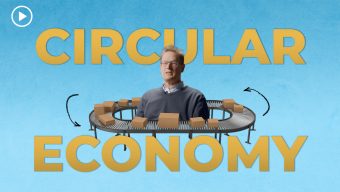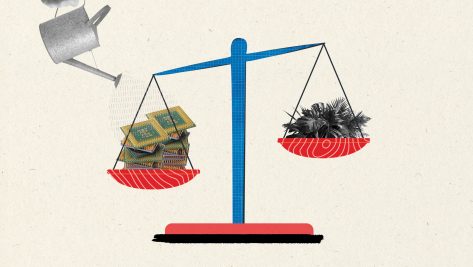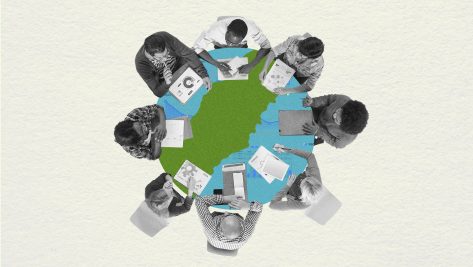Hope for the future comes with faith in the past. This was the inspiring response of Michael Ignatieff, a Canadian historian and former leader of its liberal party, to a young woman who said she did not want to bring children into a world doomed by climate change. Her sentiments reflect what is known as climate or eco-anxiety. The syndrome is on the rise around the world, particularly among young adults, caused by the news and predictions of how climate change could – or will – irrevocably doom our civilization on planet Earth.
Dr. Hannah Ritchie, author of Not the End of the World, is only 30 years old and “has been there.” As she states right at the start of her book she thought there was no future left for her generation. It was her job as head of research and now editor of the data aggregator Our World in Data that helped her see the bigger picture around the climate crisis and arrive at a “truly radical, game-changing and life-saving” conclusion: that humanity is in a unique position to build a sustainable future. Her rulebook now involves looking at the long-run data to identify the trends that prove how we “make progress against the world’s largest problems.” We could very well say that Ritchie’s methodology echoes the beautiful words of Ignatieff, that it is when looking at the world’s past that you find hope for the future.
Not the End of the World came out at the start of the year and has gained critical acclaim from those in the know. Bill Gates was quick to invite Ritchie onto his podcast, Unconfuse Me, and Michael Liebreich hosted her on his Cleaning Up series. Ritchie’s book takes readers through the magnificent seven environmental challenges facing humanity: air pollution, climate change, deforestation, food, biodiversity loss, ocean plastics, and over-fishing. While climate change certainly has the farthest-reaching implications, it is just one of Ritchie’s seven challenges. Air pollution, for example, kills approximately seven million people every year, a tragic human tally unmatched by any other environmental threat. Yet, here’s the thing: both air pollution and climate change share fossil fuels as their number one culprit – so phasing out the burning of coal and petrol will help mitigate both. This is one of the most salient messages of the book, that amongst the world’s environmental problems, there are many interdependencies, which sometimes work in the same direction and other times pull in opposition. This “systems thinking” takes the reader to unexpected conclusions that often contradict our deep-rooted assumptions and intuitions, and our misconceptions.
Richie calls on her generation to be reasonably optimistic that it may very well become the first to attain the sustainability ideal: “meeting the needs of the present without compromising the ability of future generations to meet their own needs.” The dilemma of choosing between human well-being and environmental protection does not have to exist in the future because “there is hope that soon there will be no trade-off between having plentiful energy and a low carbon footprint.” Per capita emissions capped back in 2012 and have been falling since, albeit slowly – and in a world with an increasing population, whenever a per capita metric caps, that is a sign that the peaking of its total value is around the corner. The ever-growing deployment of renewable energies and electric vehicles is a first.
There is still plenty of homework ahead of us. Ritchie asserts that while we already possess the necessary tools to achieve this sustainability ideal, the challenge lies in effectively deploying them on a global scale. She advocates for “large-scale systemic and technological change” alongside new political and economic incentives like a global price on carbon. Individual behavior changes are not enough. In the words of the late David JC Mackay “if everyone does a little, we will achieve only a little.” Ritchie agrees: “our sustainability solutions need to be scalable for many billions of people” and hammers the inadequacy of deep-rooted beliefs that idealize the way of life of rural or indigenous communities. Urban living often comes with a lower carbon footprint. She debunks the “good old natural fallacy” in which things that seem more grounded in natural properties are better; and calls for a societal shift in how we think about sustainability, concluding that “lab grown meat, dense cities and nuclear energy need a rebranding.” Her numbers show that nuclear energy is one of the safest sources of (low carbon) energy ever and that the carbon footprint of urban crowds is lower than those of suburban or rural dwellers.
Measures to reduce single-use plastic packaging are good, but do not pass the scalability test in the short run.
Plastics need a rebranding too, according to Ritchie. The “wonder material” has grown from two million tons a year to 460 million in less than 75 years, comes in a myriad of forms and functions, and does so cheaply. Plastics are essential to global trade and global food supply: they are present wherever goods are traded. Ritchie regrets that there is no single alternative technology to plastics today and reminds the reader that replacing plastic with paper-based materials strains the timber industry, which is one of the major drivers of deforestation and biodiversity loss in tropical areas.
The big issue with plastics is that 350 million tons become waste every year, mostly from packaging – 80 million tons of which are poorly managed, with eight million tons dumped into the rivers and one million making it to the high seas. Since mechanical recycling of plastic is limited to at most two cycles, it does not avoid its waste, it just delays it. Measures to reduce single-use plastic packaging are good, but do not pass the scalability test in the short run. Proper waste management is therefore an urgent must. High-income countries have learned to manage plastic waste properly and the bulk of plastic in the oceans (81%) comes from low- and middle-income countries in Asia. Wealthier nations should leverage their expertise and resources to help lower-income countries invest in proper waste management.
At this point, readers would not be surprised to know that Dr. Ritchie is not a fan of degrowth utopias as a solution to our environmental challenges. By the numbers, she details how, if we wanted the whole world to enjoy life like the Danish do, the global economy would need to be at least five times as large as it is now. Or, let’s say we drop expectations down a bit and have all eight billion inhabitants of the world living on US$30 a day, the economy would need to be double the size that it is today. Degrowth is one of those myths rooted in our eternal longing for a simpler way of life. The Roman poet Horatio expressed it in his famous Beatus Ille 2,000 years ago. Cervantes, in the 1600s, had Don Quixote sing his “dichosa edad y siglos dichosos”, praising the times of the happy Arcadia.
Ritchie explains that recycling – “the universal brand of a conscientious environmentalist” – does not take us very far in reducing our carbon footprint: that more important than the plastic bag is what you put in it – aka our eating habits! She is adamant about how we need to change our eating habits by reducing the consumption of beef – Brazilian beef production alone is responsible for 25% of global deforestation. The impact of the beef industry is almost inconceivably broad, from deforestation and biodiversity loss to methane emissions and extensive land use change. In Not the End of the World, Ritchie details her strong opposition to first-generation biofuels due their land requirements, contributions to tropical deforestation, and the fact that they compete with other food supplies just to end up in the tank of a car. These biofuels consume as much energy as they produce, leaving behind a very doubtful carbon footprint. She is tempted to call for a boycott of Germany’s palm oil imports from Indonesia for biofuel production.
These insights are among the many well-grounded and unexpected findings in the book, which makes for great reading thanks to the author’s talent for seeing the wood for the trees, particularly in the midst of so much data and so many trends. A review would be incomplete, however, without noting the author’s perspective on the role of free press and news networks in educating the public about climate change. When at university, Hannah Ritchie made a point to actively keep up with the news and what she learned was that “everything was getting worse”: natural disasters, draught, hunger, disease, and poverty. Thanks to her teacher, the late Swedish physician and statistician Hans Rosling, Ritchie eventually realized that to try and understand the world only through the news was a “terrible way to understand the bigger picture” and that a better way to see change “is to step back and look at the long-run data.” Among the most important teachings of Not the End of the World is Ritchie’s concept that “to build an environmental world view based on the latest wildfire or hurricane is no good.” It would be great news indeed if the free press took note of this advice and, in between El Niños and category 5 hurricanes, provides reader and listener with hard data, information that gives us the power to be optimistic that we can “solve our environmental problems while improving human well-being at the same time.”
© IE Insights.











